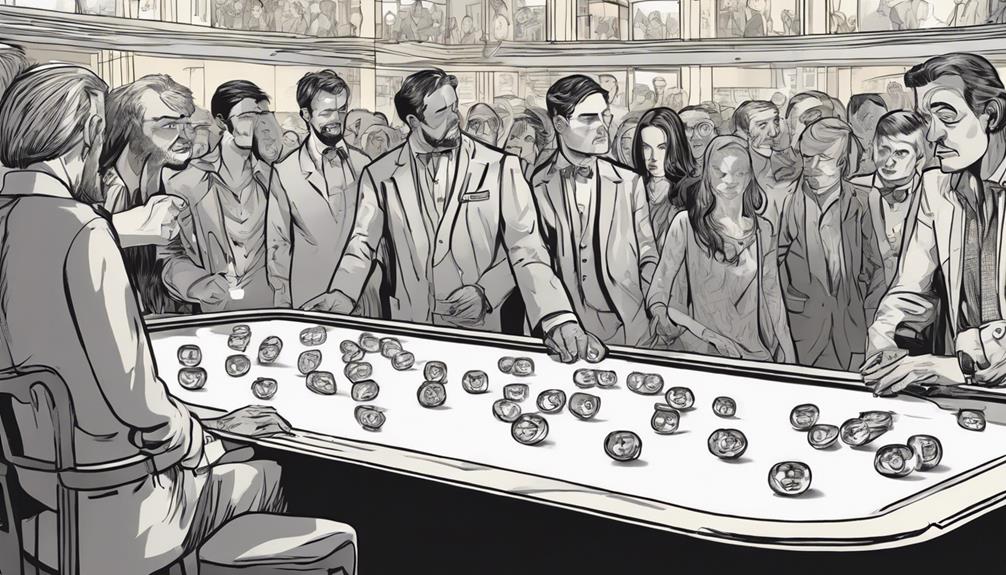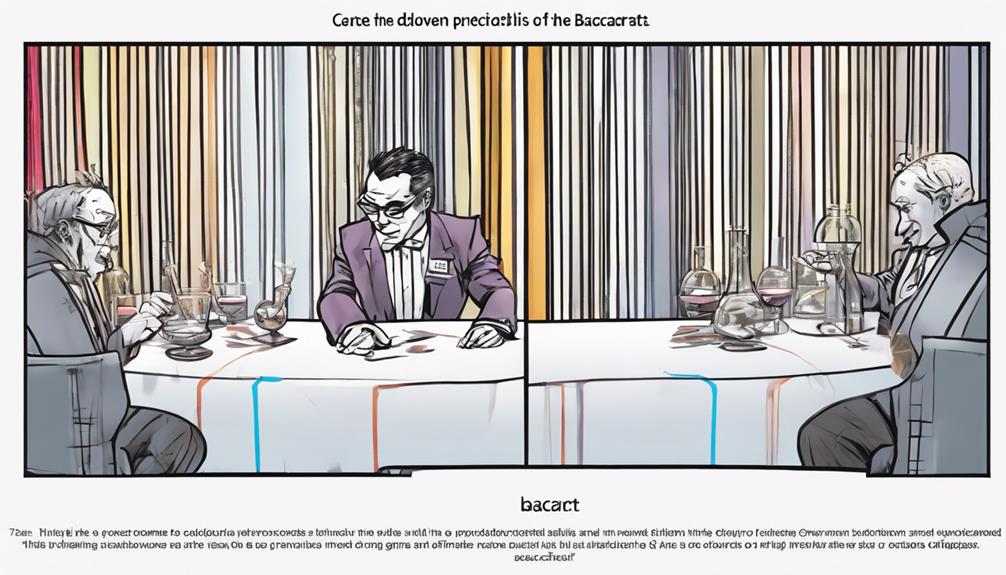Evaluating a baccarat predictor’s accuracy involves analyzing its predictive performance against real outcomes, considering algorithm complexity and data quality, and reviewing user feedback—factors like historical data use, game understanding, and shuffling impact predictor success. Statistical analysis reveals insights, but limitations exist due to unpredictable player decisions. Realistic expectations view predictors as aids, not guarantees. Pattern recognition methods enhance accuracy, with debates on predictor effectiveness ongoing. To understand more about the accuracy of baccarat predictors, explore factors like testing reliability, improving win rates, and considering strategies for enhanced prediction capabilities.
Key Takeaways
- Accuracy varies based on algorithm complexity and data quality.
- Real-world testing is crucial for accurate forecasting.
- User experiences show mixed results with predictors.
- Historical data analysis and patterns influence prediction success.
- Utilize statistical analysis for evaluating predictor consistency.
Evaluating the Accuracy of Baccarat Predictors

When evaluating the dependability of baccarat predictors, it is important to assess their predictive performance against real-world baccarat gameplay outcomes thoroughly. Baccarat prediction accuracy is a key metric used to determine the effectiveness of these predictors. While some software claims high success rates of up to 99%, the accuracy can vary based on the algorithm’s complexity and the data analysis quality. Users’ experiences with baccarat predictors show mixed results, indicating the critical nature of accuracy assessment. To truly gauge the reliability of a baccarat predictor, it is essential to test its predictions in live gameplay scenarios. This real-world testing provides concrete evidence of the predictor’s ability to forecast baccarat outcomes accurately.
Factors Influencing Baccarat Prediction Success

The success rate of a Baccarat predictor is greatly influenced by the quality of algorithms employed for analysis. When considering factors that impact prediction success, statistical analysis becomes vital:
- Historical Data and Patterns: Utilizing past game outcomes to identify trends and patterns can enhance prediction accuracy.
- Understanding Game Rules and Probabilities: A deep understanding of Baccarat rules and probabilities is essential for making informed predictions.
- Shuffling Frequency and Randomization: Factors like how often cards are shuffled and the level of randomization in gameplay can affect the reliability of predictions.
- User Interaction and Feedback: Incorporating user interaction and feedback mechanisms can help refine algorithms and improve the overall effectiveness of the Baccarat predictor.
Discover the latest insights in the world of บาคาร่า with in-depth articles provided by Nanigans.com
Statistical Analysis of Baccarat Predictor Performance

Analyzing the statistical performance of Baccarat predictors provides valuable insights into their predictive accuracy and reliability in forecasting game outcomes. These prediction software tools claim high accuracy rates, often around 99% in outcome predictions, by employing algorithms that analyze historical patterns and trends in baccarat games. By providing recommendations on where to place bets to maximize winning chances, users rely on the predictor’s performance to make informed betting decisions. Statistical analysis plays a vital role in determining the success of these prediction models in forecasting game outcomes. This analysis involves evaluating the consistency of the predictor’s recommendations against actual game results, allowing users to gauge the effectiveness and trustworthiness of the prediction software in the context of baccarat gameplay.
Limitations of Baccarat Prediction Models

Despite the claims of high accuracy rates, baccarat prediction models face significant limitations attributed to the game’s inherent randomness and unpredictability. When considering the probability of winning, the following factors contribute to the challenges faced by these models:
- Card Shuffling: The constant shuffling of cards in baccarat makes it difficult for prediction models to track the sequence of cards accurately.
- Unknown Card Sequences: Models struggle to predict outcomes when dealing with unknown card sequences, impacting their reliability.
- Player Decisions: The element of human decisions in baccarat, such as when players choose to hit or stand, introduces a level of unpredictability that models find challenging to account for.
- Historical Data Limitations: Past data used in prediction models may not always align with future outcomes accurately, affecting the overall effectiveness of these models.
Realistic Expectations From Baccarat Predictors

Given the challenges posed by the randomness and unpredictability inherent in baccarat prediction models, setting realistic expectations regarding their accuracy is essential for users seeking guidance in their betting strategies. While baccarat predictors may claim high success rates, users must understand that no predictor can guarantee wins due to the game’s nature. These tools rely on historical data analysis and pattern recognition to suggest potential outcomes for each hand, but they do not eliminate the game’s inherent randomness. Players should view baccarat predictors as aids in decision-making rather than as foolproof strategies for success. Users should combine the predictions with sound betting strategies and responsible gambling practices to effectively utilize these predictors to enhance their gaming experience.
Testing the Reliability of Baccarat Predictions

Evaluating the prediction accuracy of baccarat software involves examining its real-world prediction results. By testing the reliability of baccarat predictions through trial experiences, users can gain valuable insights into the software’s effectiveness. The ability to confirm predictions in practical scenarios is essential for users to make informed decisions about the software’s trustworthiness and utility.
Prediction Accuracy Assessment
The evaluation of baccarat prediction accuracy entails a systematic analysis of historical data and a rigorous calculation of success rates to determine the reliability of such forecasts. When analyzing the precision of baccarat predictions, several key points are taken into account:
- Expected Value Analysis: Evaluating the expected value of baccarat predictions helps understand the forecasting model’s effectiveness.
- Comparison with Actual Results: The reliability of predictions is tested by contrasting the suggested outcomes with the actual game results.
- Long-term Performance: Evaluating prediction accuracy over an extended period provides insights into the consistency of the forecasting method.
- Statistical Significance: Utilizing statistical tests to measure the importance of prediction success rates aids in determining the reliability of baccarat predictors.
Real-world Prediction Results
Real-world assessments of baccarat prediction software have yielded a spectrum of outcomes regarding their reliability in forecasting game results. Users have reported instances where the software accurately predicted game outcomes, aligning with their recommendations. However, contrasting experiences exist, with some users noting discrepancies between the software’s predictions and the actual results observed during gameplay. Testing the reliability of baccarat predictors often involves comparing the suggestions provided by the software with the outcomes of games, including scenarios where the third card is drawn. To determine the effectiveness of baccarat prediction software, users are advised to conduct personal trials and evaluate the software’s predictive capabilities in real-world gaming situations.
Strategies to Enhance Baccarat Prediction Accuracy

To enhance baccarat prediction accuracy, employing data analysis techniques, pattern recognition methods, and statistical modeling approaches are essential. These strategies can provide valuable insights into the game’s trends and dynamics, allowing for more informed predictions. By integrating these methodologies, players can optimize their predictive abilities and potentially increase their chances of success in baccarat.
Data Analysis Techniques
Using advanced data analysis techniques is essential in refining baccarat prediction accuracy and enhancing strategic decision-making in the game. To achieve this, consider the following strategies:
- Utilize statistical analysis: Identify patterns in baccarat outcomes to make more accurate predictions in this game of chance.
- Implement machine learning algorithms: Process large datasets to improve prediction accuracy and decision-making processes.
- Incorporate historical data: Utilize information on card distributions and previous game results to enhance predictive models.
- Apply simulation techniques: Simulate baccarat games to refine prediction strategies and assess different scenarios effectively.
Pattern Recognition Methods
Analyzing historical data and outcomes is essential in implementing effective pattern recognition methods to enhance baccarat prediction accuracy. Strategies such as tracking previous hands, streak recognition and statistical analysis play a vital role in predicting the outcome of baccarat games. By identifying repetitive patterns and trends, players can make more informed decisions on where to place their bets. Utilizing algorithms designed for pattern recognition can greatly improve the accuracy of baccarat predictions by capitalizing on outcome variations. These methods aim to leverage historical data to increase the chances of accurately predicting future baccarat game results. Successful pattern recognition enhances the overall predictive capabilities in baccarat gameplay.
Statistical Modeling Approaches
Statistical modeling approaches play a pivotal role in elevating the accuracy of baccarat prediction by leveraging historical data and patterns to inform strategic betting decisions.
- Analyzing card frequency, game outcomes, and streaks helps enhance the accuracy of baccarat prediction models.
- Utilizing probabilistic models and simulation techniques can improve the predictive capabilities of baccarat prediction software.
- Advanced algorithms factor in various variables to calculate probabilities and suggest the best betting strategies in baccarat games.
- Incorporating machine learning algorithms and artificial intelligence techniques can refine baccarat prediction accuracy by adapting to changing game dynamics.
Improving Baccarat Win Rates With Predictors

By harnessing the power of advanced algorithms, baccarat predictors aim to enhance win rates through the analysis of historical data and patterns, enabling players to make more informed decisions during gameplay. These predictors utilize complex mathematical models to predict potential outcomes and suggest where to place bets in the game, offering a strategic advantage to users. While some players have reported positive experiences with increased winnings when using baccarat predictors, the accuracy and effectiveness of such tools remain a subject of debate. The perceived edge gained by using predictors in baccarat games has sparked controversy surrounding their legitimacy and ethical considerations. As users continue to explore these tools, the discussion on the role of predictors in improving baccarat win rates persists within the gaming community.
Conclusion
To sum up, the accuracy of baccarat predictors can vary depending on various factors such as statistical analysis, limitations of prediction models, and testing reliability. While these predictors can provide insights and strategies to enhance win rates, it is important to maintain realistic expectations and understand that they are not foolproof. By continuously improving prediction models and strategies, players can increase their chances of success in baccarat games.







